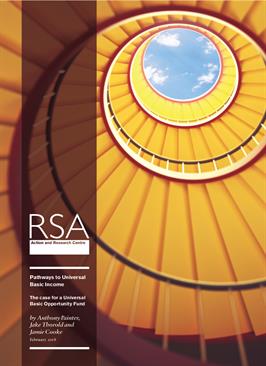In the UK, millions of people circle in and out of poverty; are exposed to insecure forms of work; and rely on a welfare system which can seem more intent on punishing than helping. New and practical thinking is desperately needed.
This report is the third in an RSA series aiming to highlight economic insecurity as a central problem of our time. It also builds on the RSA’s work on Universal Basic Income, mapping out practical steps of how we can move towards a full UBI whilst designing a system that promotes good work and pushes back on economic insecurity.
The central proposition is the creation of a Universal Basic Opportunity Fund (UBOF): an effort to reimagine how society supports people to live meaningful, contributory lives. Its premise is simple: fund every citizen under the age of 55 with a £5,000 opportunity dividend for up to two years, taken at a time of their choosing over the course of a decade. The fund would initially last for ten years, with dependent children also eligible for the payment in the year a parent, or both, were receiving it.
Our intention is to consider how, through capturing asset wealth, the UK can begin to move to a system of support for incomes that genuinely equips citizens to adapt to changes in their lives, whether driven by economic change or personal circumstances. It is intended to encourage a discussion; we do not claim that what is contained here is a blueprint. However, the design principles and funding mechanisms we lay out could allow citizens to make major changes to their lives which they would otherwise be constrained from doing.
Instead of citizens receiving support in a heavily targeted and conditional fashion underpinned by state paternalism, the Universal Basic Opportunity Fund begins the journey towards a system of universal support and trust in human freedom. At the core of the UBOF idea is a conviction that people seek purpose and - if given the opportunity, freedom, and support to do so - will usually make the best decisions about their own lives.We estimate the cost of the UBOF to be approximately £14.5bn per annum over 13 years, with the cost each year dependent on how many citizens elected to take the payment and at what point in the year.
As a practical means of advancing the UK towards a Universal Basic Income system, the UBOF represents a stepping stone – to be enacted now – towards a better way of enabling citizens to live meaningful and contributory lives.
pdf 1.4 MB
Contributors



